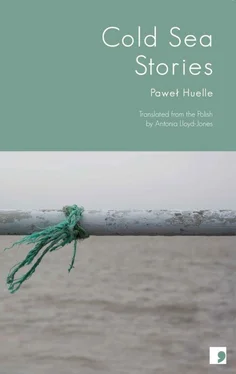That evening, when Jansen came to the bottom of the cliff with a helper to dress the carcasses on the spot, all three of them had laughed about it. No peasant or even a tenant farmer here had a lifelong right like that: there had been twenty-five sheep and four rams, including the bellwether. Bjorn listened avidly to their stories about the master from Ventlinge. Since returning from the war on the other side of the sea, he spent long evenings alone by the fireplace, reading the Bible aloud. Sometimes he could also be heard through the closed door, calling for his comrades who were killed in battle – those from Dalarna, those from Uppaland and those from Scania. Surrounded by the enemy cavalry, they had fought like lions, but as well as their sabres the Poles had the force of Catholic incantations behind them, and it was those that caused the field by the river to be strewn in hundreds of Swedish corpses that day. Maybe that was why the master from Ventlinge, since returning to Öland from the war, never took part in the royal hunts, had hung his rapier on the wall and read the Bible aloud? At around midnight they finished the work; Jansen loaded a cart with all that could be saved, which belonged to the estate, and the rest they laid on a pile of brushwood. A great, sizzling flame lit up the cliff, and the odour of burning tallow and innards trailed along the stony beach until morning.
However, some odds and ends had been left over from that feast of the gods, and now as he gazed at the pasture, the sheep and the clouds, Bjorn could smell the long forgotten aroma of roasted meat, and with it he felt a gnawing pain in his stomach. He reached into his sack for a piece of dried fish. As he chewed it, he walked up to the precipice. The daily view of the open space where water and air merged together somewhere very far away had never consoled Bjorn, for although the hues and shapes of the clouds often changed here, as did the colour of the sea, the empty void was always the same, unencompassed, like the wind roaring in the grasses on the plateau and the waves splashing against the boulders. Only occasionally, when the visibility was good, could his eyes spy out in the distance the small outline of a ship heading for Kalmar, or south to Karlskrona, but Bjorn had no telescope and was spared the joy of identifying the flags or the sight of the full sails.
But since last year the edge of the precipice had changed out of all recognition. Where the plateau ended, as if cut off by a knife, and the cliff fell away at an almost vertical stroke, a low stone wall had arisen on the orders of the steward, the fruit of several months’ work, and now almost finished. Bjorn leaned his hands on the stones and gazed at the sea. From the southern side, on the dark-blue line of the horizon a small dot had appeared. It was too far away to tell what kind of ship it was, and anyway, what did it matter? The island was bypassed by merchants and mariners. Bjorn turned away from the stone wall and made himself comfortable upon the grass. The sun was already quite high, seagulls, larks and siskins were calling to each other shrilly, the last patches of snow had disappeared from the plateau a couple of weeks ago, and the smell of thawed earth was finally heralding some long, warm days. Bjorn thought about the master from Ventlinge: how noble he must have looked on his charger, rapier in hand, beneath the fluttering banner of the royal ensign, as he gave the order to attack. But what could be the meaning of the incantations Jansen had mentioned? Were the Catholics in a pact with the devil? And if so, why had God given them the victory? Under his drooping eyelids Bjorn could see a nameless river, with the corpses of the masters from Dalarna, the masters from Uppaland, and the masters from Scania floating along it. Their proud emblems, estates, jewels and titles – what were they now, as they lay dead in a foreign land? For a while longer Bjorn’s thoughts revolved around the tumult of battle, until at last, to the tune of the sea’s monotonous roar they lost focus, imperceptibly crossing the border into a dream.
It started with the light, quiet strokes of long oars. The boat was long too, and both ferrymen, dressed rather gaudily, rhythmically leaned forward from the prow and the stern over the calm water, in which the façades of churches, the arcs of bridges and the gates of palaces slowly shifted in mirror image. The passengers – a man of about thirty-five and a small boy – were not talking to each other. Only when the boat had sailed away from the city and its cupolas were glowing honey-gold in the distance did the man place a hand on the boy’s arm and repeat the word: ‘ Serenissima! ’ The boy began to cry. The boat came alongside a galleon at anchor in the bay. The boatswain’s whistle sounded, and the sails were set. The ship moved off majestically, and the city disappeared in the dawn of the rising sun as suddenly as if it had never existed.
Bjorn awoke with a vague sense of happiness and sorrow all at once. The city was beautiful and the waters in the bay were warm, but the journey – or rather that departure – carried the burden of irreversible events. Bjorn knew that dreaming was dangerous, because dreams offer impossible things, and so after waking it is best to set to work at once. So he did, heading for a small pyramid, where the stones he had gathered from the pasture were heaped on top of each other. He carefully chose a large, angular rock and picked it up in both hands; once he had positioned the point of gravity on his right shoulder, like an athlete he slowly carried the stone towards the precipice. The wall was almost finished now, and Bjorn reckoned with satisfaction that in two, or at most three days he would make his way to the steward to report it to him. He was sure to hear a stream of abuse, but what did it matter, if they entrusted a flock to him again? For the past year he had too often gone hungry, and for the sight of the shed with sheep’s-milk cheeses ripening on long shelves inside it, for that nourishing hope, he was ready to put up with far worse things.
As he pondered it all, he fitted the angular rock into the exact spot where the wall seemed weakest, and then with a sense of satisfaction he looked up at the sea, only to let his jaw drop in amazement at almost the very same instant. The small dot which had been visible on the horizon three-quarters of an hour ago had not moved towards Kalmar as usual, but had most evidently deviated from the common route and was approaching the island. A middle-sized three-mast ship in full sail was growing before his eyes. Now Bjorn could clearly see the crow’s nest with the tiny figure of a sailor; the bowsprit, with yet another observation basket hanging underneath it; and several guns with covers over their muzzles. Two stone’s throws away from the rocky shore the ship made an abrupt turn, furled its sails and stood at anchor parallel to the cliff, which allowed Bjorn, crouching behind his wall, to make out its name. On these waters the name ‘Doña Juanita’ sounded rather unusual, but swallowing his saliva, Bjorn did not stop to wonder about it. His gaze and attention were entirely riveted by the rapid activities amidships. A windlass creaked and the sailors lowered a sloop, in which he saw two rowers and a man dressed in a trailing black coat. There could be no doubt he was the one giving the orders here. In one hand he was holding a hat adorned with feathers, while with the other, as soon as the sloop was bobbing on the water, he made urgent gestures. Their meaning was obvious: cast off the rope, take up the oars, and follow the shortest course to the shore. This hurry seemed strange on a bright, sunny day, when neither wind nor waves could threaten a safe landing. There was a strange silence on board the ship. The sailors at the yardarms and the anchor lines were evidently waiting for the sloop to come back, but this readiness, as if enforced by iron discipline, was being conducted in stillness and total silence. No one called out to anyone else, nor did anyone abandon his post for a moment. But strangest of all was what happened a little later on the shore: the two sailors put down their oars, pushed the sloop onto a gravel bank, disembarked their master, handed him a large sack-like saddlebag, then fetched a chest with iron fittings out of the sloop and set it down in the middle of the beach.
Читать дальше












